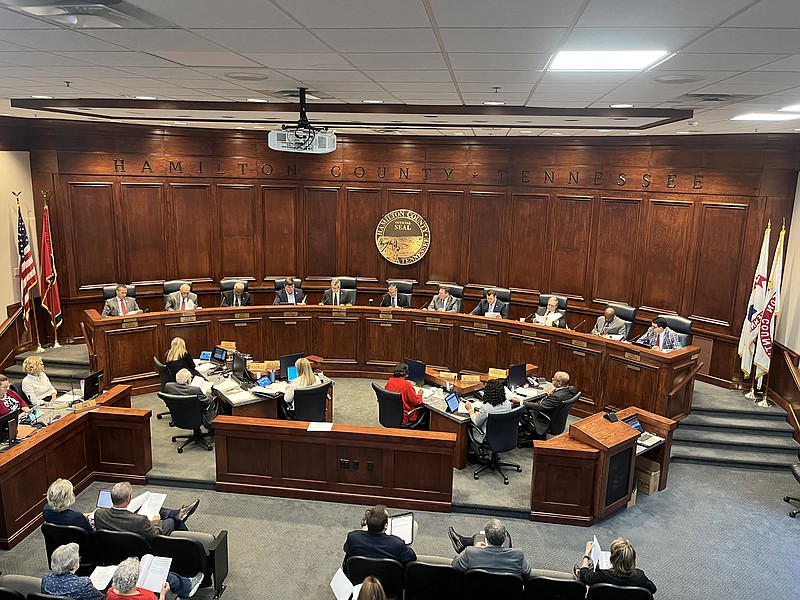Commissioner Gene-o Shipley, R-Soddy-Daisy, wants to strengthen policies governing short-term vacation rentals in Hamilton County and floated the idea of a resolution to members of the County Commission during a meeting last week.
"I'm not saying we should deny anyone the right to use their land as far as what they want to do," he said. "But the people involved next to them should have the right to protect their property as well, and they're not right now."
In addition to limiting the number of illegal short-term rentals, Shipley told the Chattanooga Times Free Press by phone that he primarily wants to ensure that nearby residents are properly notified when a property owner intends to seek a permit, allowing them to weigh in during the approval process.
Shipley said he doesn't want to stifle short-term vacation rentals but they can be disruptive to neighbors.
"All of a sudden, we go from a quiet neighborhood to Airbnbs and short-term rentals, and the homeowners adjacent have not had a right to say, 'We don't want this,'" he said.
Dan Reuter, director of the Chattanooga-Hamilton County Regional Planning Agency, told commissioners Wednesday that several months ago the city of Chattanooga implemented a moratorium on short-term vacation rentals that aren't occupied by the owner, which is the majority of them.
It could be worthwhile for the county to go through the process of evaluating existing issues to see if there need to be any specific steps taken, he said, but he left the question of a county moratorium to the commission.
"It's a strong industry right now," Reuter said. "It's not something that we want to necessarily discourage. I don't think that's the approach. I think we're just trying to get a handle on how to manage it."
Asked by Shipley on Wednesday about the prospect of implementing a county moratorium, Hamilton County Attorney Rheubin Taylor said there are some limits on what the county government can do in unincorporated areas.
"We're aware of the problem, and we're looking into various means to approach it," he said.
Taylor said in an email Friday that he and members of his staff met Friday with the county's building inspection department and discussed some possible modifications "that may be presented to the commission at the appropriate time."
(READ MORE: Amid housing crises, vacation towns limit short-term rentals)
Commissioner Warren Mackey, D-Lake Vista, on Wednesday questioned the wisdom of restricting how property owners can use their land.
"We are capitalists," he said during the meeting. "We seek economic development. We continue to hear this message: Not in my backyard. What I'm hoping this new zoning committee will do is ask everyone if their family has paid taxes on property for years and years, waiting for the optimum point where they can develop that, would they want government telling them if they could develop their property?"
Vice Chairman Joe Graham, R-Lookout Valley, said Wednesday that companies like Airbnb use ratings to measure the quality of renters and rentees, which can help limit the number of visitors with a history of poor behavior.
"There is a system in place to try to weed out the bad ones," Graham said. "Do they always get them? No. But it is also a huge tax benefit not only to our local government for property taxes but the source of sales tax and income. I do agree that we need to address this issue. ... We need to be mindful of the property owners but also mindful of the neighbors.
"I don't know what the silver bullet would be or what the answer would be, but I do know that they're here to stay," he added, "and I think we can all put our heads together to come up with a solution that we can all live with."
Bryan Shults, the Regional Planning Agency's director of development services, said in an email that there are limited rules and regulations on short-term vacation rentals other than having to apply for a special permit.
The rentals are allowed in the county by special permit in all residential zones with the exception of the R-1 single family residential district. They are permitted by right in R-3 multifamily residential zones.
(READ MORE: Chattanooga City Council will consider further restrictions on AirBnb, similar rentals)
According to existing guidelines, a short-term vacation rental can receive a permit after a public hearing by the Chattanooga-Hamilton County Regional Planning Commission as long as it abides by certain conditions. All abutting property owners receive a letter from the Regional Planning Agency advising them of that hearing, and staff also places yellow notification signs on the property, Shults said.
Among other requirements, the rentals cannot have more than five sleeping rooms, cannot post signage and cannot be rented for group events like weddings or business meetings.
If the rental has two county or state violations within a 12-month period, the County Commission can revoke a special permit after notifying the owner and holding a public hearing. Hosts who lose their permit are prohibited from reapplying for one year.
Contact David Floyd at dfloyd@timesfreepress.com or 423-757-6249. Follow him on Twitter @flavid_doyd.
